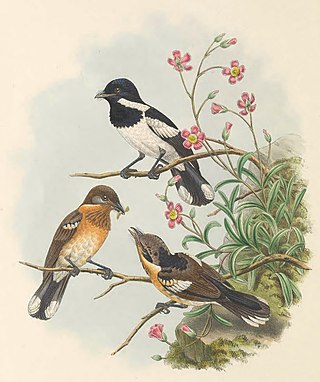
The bearded vulture, also known as the lammergeier and ossifrage, is a very large bird of prey and the only member of the genus Gypaetus. Traditionally considered an Old World vulture, it actually forms a separate minor lineage of Accipitridae together with the Egyptian vulture, its closest living relative. It is not much more closely related to the Old World vultures proper than to, for example, hawks, and differs from the former by its feathered neck. Although dissimilar, the Egyptian and bearded vulture each have a lozenge-shaped tail—unusual among birds of prey. It is vernacularly known as Homa, a divine bird in Iranian mythology.

The bearded seal, also called the square flipper seal, is a medium-sized pinniped that is found in and near to the Arctic Ocean. It gets its generic name from two Greek words that refer to its heavy jaw. The other part of its Linnaean name means bearded and refers to its most characteristic feature, the conspicuous and very abundant whiskers. When dry, these whiskers curl very elegantly, giving the bearded seal a "raffish" look.

The common bulbul is a member of the bulbul family of passerine birds. It is found in north-eastern, northern, western and central Africa.

Dianthus barbatus, the sweet William, is a species of flowering plant in the family Caryophyllaceae, native to southern Europe and parts of Asia. It has become a popular ornamental garden plant. It is a herbaceous biennial or short-lived perennial plant growing to 13–92 cm tall, with flowers in a dense cluster of up to 30 at the top of the stems. Each flower is 2–3 cm diameter with five petals displaying serrated edges. Wild plants produce red flowers with a white base, but colours in cultivars range from white, pink, red, and purple to variegated patterns. The exact origin of its English common name is unknown but first appears in 1596 in botanist John Gerard's garden catalogue. The flowers are edible and may have medicinal properties. Sweet William attracts bees, birds, and butterflies.

The Bornean bearded pig, also known as the Sunda bearded pig or simply bearded pig, is a species in the pig genus, Sus.
Barbatus of Benevento, also known as Barbas, was a bishop of Benevento from 663 to 682. He succeeded Ildebrand in this capacity. He assisted in a church council called by Pope Agatho in Rome in 680 and in 681 attended the Third Council of Constantinople against the Monothelites.

The Solomons monarch, also known as the black-and-white monarch, is a species of bird in the family Monarchidae. It is endemic to the Solomon Islands archipelago. Its natural habitat is subtropical or tropical moist lowland forests. It is threatened by habitat loss.
Melbournopterus is a genus of prehistoric chelicerate or brachiopod, known from the Upper Silurian of Australia. It is of uncertain taxonomic placement within the subphylum Chelicerata. Lamsdell, Percival and Poschmann (2013) argued that Melbournopterus crossotus is not a chelicerate at all, and interpreted its type specimen as the dorsal valve of a craniate brachiopod.

Dactyloscopus crossotus, the bigeye stargazer, is a species of sand stargazer native to the coastal Atlantic waters of Florida, United States and from the Bahamas to Brazil where it prefers sandy beaches at depths of from 0 to 3 metres, occasionally down to 8 metres (26 ft). It buries itself in the sand to ambush prey, leaving only its eyes, mouth and nose exposed. It can reach a maximum length of 7.5 centimetres (3.0 in) TL.

Crossotus is a genus of longhorn beetles of the subfamily Lamiinae.
Crossotus albicollis is a species of beetle in the family Cerambycidae. It was described by Félix Édouard Guérin-Méneville in 1844. It is known from Ethiopia, Burkina Faso, Chad, the Central African Republic, Ghana, Ivory Coast, Cameroon, Senegal, Mali, Morocco, Niger, Nigeria, Kenya, Mauritania, and Western Sahara.
Crossotus arabicus is a species of beetle in the family Cerambycidae. It was described by Gahan in 1896.
Crossotus brunneopictus is a species of beetle in the family Cerambycidae. It was described by Fairmaire in 1891.
Crossotus erlangeri is a species of beetle in the family Cerambycidae. It was described by Hintz in 1912.
Crossotus klugi is a species of beetle in the family Cerambycidae. It was described by William Lucas Distant in 1892. It is known from Botswana, South Africa, Namibia, Mozambique, and Zimbabwe.
Crossotus strigifrons is a species of beetle in the family Cerambycidae. It was described by Fairmaire in 1886.

Crossotus stypticus is a species of beetle in the family Cerambycidae. It was described by Pascoe in 1869. It is known from Mozambique, Botswana, South Africa, Namibia, and Tanzania.
Crossotus sublineatus is a species of beetle in the family Cerambycidae. It was described by Gestro in 1892. It is known from Chad, Algeria, Mauritania, Djibouti, Ethiopia, Somalia, Mali, Morocco, Kenya, Niger, Senegal, and Sudan.
Crossotus ugandae is a species of beetle in the family Cerambycidae. It was described by Breuning in 1936. It is known from Kenya and Somalia.

Crossotus vagepictus is a species of beetle in the family Cerambycidae. It was described by Fairmaire in 1886. It contains the varietas Crossotus vagepictus var. niveicollis.








